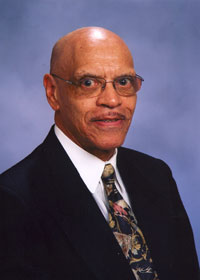Paul Eugene Thurston ’60 inspired generations of students as a professor of chemistry at Texas Southern University
By Dan Edelen
 For Paul Eugene Thurston ’60, a career filled with purpose and accomplishment as a chemistry professor at Texas Southern University grew from one of the oldest of sayings: Take it or leave it.
For Paul Eugene Thurston ’60, a career filled with purpose and accomplishment as a chemistry professor at Texas Southern University grew from one of the oldest of sayings: Take it or leave it.
As a teenager having already committed to another college, Thurston got an unexpected phone call while he was working as a bellhop at a New Jersey hotel. A representative of the National Scholarship Service and Fund for Negro Students said Lafayette would offer him a scholarship, a matching loan, and an on-campus job. Plus, NSSFNS would sweeten the deal with a grant. Would he accept?
“Can I think about it?” Thurston asked. “We need to know now,” he was told. He said yes, and with that his life took a deliberate, yet unexpected, turn.
Thurston had been told as a youngster that he had a gift “to see chemistry” and never doubted he would pursue that discipline. “My expectation was to get a degree and go to work for a chemical company like DuPont,” he says. But at Lafayette another desire awakened in him. His first-year English instructor impressed him with his concern while helping him hone his writing. Chemistry faculty, particularly William F. Hart, showed that good professors reach out to students as individuals. So, while chemistry continued to fascinate Thurston, a call to instill knowledge and mentor future generations grew more powerful than the lure of business.
So he pursued a Ph.D. in organic chemistry at Cornell University, finishing in 1964, then honored an ROTC commitment to the Army, working with a civilian team perfecting the chemical components of solid-fuel rockets at the Redstone Arsenal in Huntsville, Ala. During the turbulent civil-rights era, Thurston struggled to adjust to his new location far from Lafayette, Cornell, and his home in Williamsport, Pa., and as he considered options for a post-military teaching career, he gave little thought to remaining south of the Mason-Dixon Line.
But when a fellow lieutenant told him about Texas Southern University, in Houston, Thurston sent a letter to Samuel Nabrit, president of the university, and was hired for the chemistry department in 1966. He gave 34 years of devoted service to the students and staff of TSU, retiring as a full professor in 2000.
“I was the first person in my immediate family to not only have a college degree, but to even graduate from high school,” he says. “Although I’m sure I could have made a lot more money working for some big chemical company, I doubt that I would have gotten the satisfaction from the work as I get from being a professor.”
In a career of challenging thousands of young people to meet high standards of academic excellence, Thurston experienced countless reminders of the importance of giving back to others.
“Seeing students each year grow, then come back later to thank me” proved one of his greatest joys, he says. “As an African American, teaching at a historically black university like TSU was icing on the cake.”
Many former students are now pharmacists, dentists, and medical doctors whom he encounters in his travels around the Houston metroplex.
An active community volunteer, Thurston says, “I’ve been given gifts by God that I use to help people when I can. It’s almost an avocation.” Each week he distributes food and clothing to the needy through Houston’s interdenominational Emergency Aid Coalition.
He also remains intensely engaged in learning – he studies Spanish and is tracing his ancestry, planning a trip to Africa in pursuit of his family’s origins. The desire to teach, which he discovered at Lafayette, still burns in him, so he volunteers as a tutor at TSU.
“My experience at Lafayette influenced my attitude about what a college professor can and ought to be,” he says.
 For Paul Eugene Thurston ’60, a career filled with purpose and accomplishment as a chemistry professor at Texas Southern University grew from one of the oldest of sayings: Take it or leave it.
For Paul Eugene Thurston ’60, a career filled with purpose and accomplishment as a chemistry professor at Texas Southern University grew from one of the oldest of sayings: Take it or leave it.